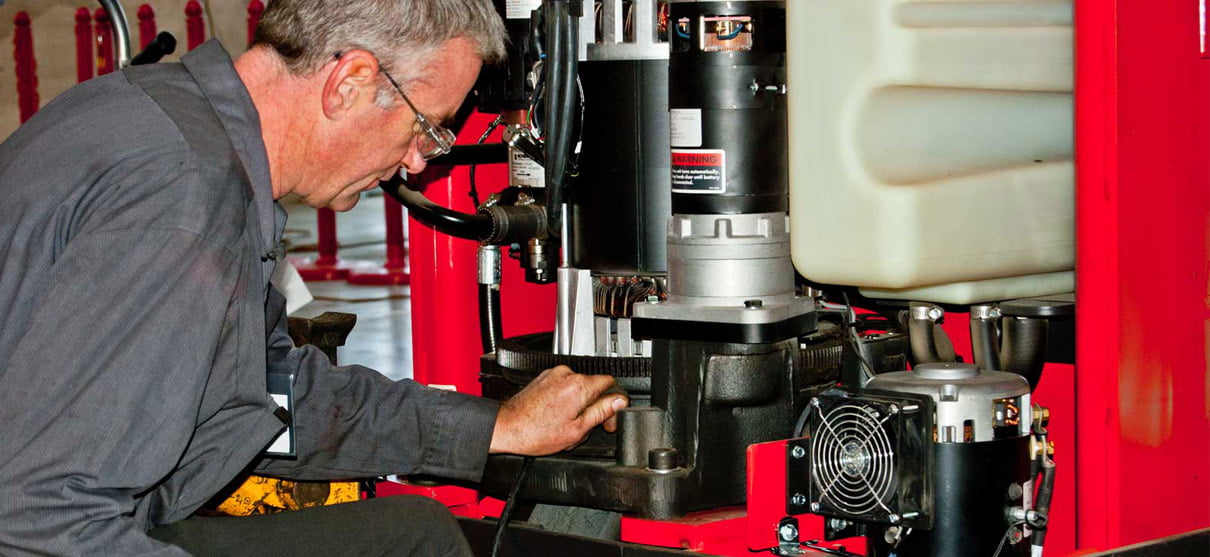Chapter 3: Compressed Natural Gas (CNG)
The process of producing CNG is quite simple. It is composed of methane which is a natural gas which is then filtered and compressed. The comparisons of utilizing CNG as a power source for lift trucks are much stronger when compared to other fossil fuels such as LPG, Diesel or Gas, as opposed to AC electric. Here are a few key areas where CNG may outperform fossil fuel competitors:
Advantages of CNG Lift Trucks over AC and other IC Lift Trucks
- No significant infrastructure investment. Often the supplier will bear the cost.
- No capacity limitations (as opposed to AC electric lift trucks).
- Produces significantly less emissions and pollutants compared to petrol (40% less Co2) which Help mitigate greenhouse gases.
- Safer than other fuels in the event of a spill/leak (lighter than air, and disperses quickly when released).
- Considered to be safer than gasoline-powered vehicles.
- Due to the absence of any lead or benzene content in CNG, the lead fouling of spark plugs is eliminated.
- Lower maintenance costs – compared to other fuel powered vehicles (less caustic and cleaner, therefore engine will generally longer).
- Increased life of lubricating oils, as CNG does not contaminate or dilute the crankcase oil.
- Less likely to auto-ignite on hot surfaces, since it has a high auto-ignition temperature (540c).
- Quick refueling, taking less than 5 minutes (opposed to electric).
Disadvantages of CNG Lift Trucks over AC and other IC Lift Trucks
- High fuel burn rate; requires more fuel to be burn to produce the same about of energy.
- Possible limitations to competitive supplier base for competitive pricing (CNG).
- Requires a greater amount of space for fuel storage than conventional gasoline powered vehicles, as it is stored as a gas at high pressure.
- Less power than petrol/diesel/LPG.
- High pressure poses greater risk.
- Not as widely available, cost outlay usually higher due to converting LPG to CNG.
- Hazardous pollutants/emissions.
- Significantly lower residual value (approximately $3500 less on 6000# capacity models)
Notes/Assumptions
- Data assumes 3,500 annual lift truck operating hours.
- PM interval for CNG/LPG lift truck is 300 hours. PM tech-time for IC lift trucks is 1.5 hrs. PM tech-time for AC lift trucks is 1 hr.
- PM interval for AC lift truck is 500 hours.
- Rate of $80/hour used. Add $25 to PM on IC lift trucks for parts.
- Please use $100/hour of additional downtime cost as industry average – not factored in any numbers.
Read The Full Series:
Chapter 1: The Concept of Total Cost of Ownership (TCO)
Chapter 2: AC Technology Compared to Internal Combustion
Chapter 3: Compressed Natural Gas (CNG)
Chapter 4: Trends in Materials Handling
Chapter 5: Voltage Levels Used in Electric Lift trucks Today
Chapter 6: Battery and Charging Systems
Chapter 7: Electric Braking and Energy Regeneration
Chapter 8: Emissions and Corporate Responsibility: A Major Problem for IC Lift Trucks
HCO Innovations is publishing this eight-part series as an in-depth comparative analysis and discussion on Compressed Natural Gas (CNG) Internal Combustion (IC) motors and Alternating Current (AC) Eletric lift truck engines, Comparison Analysis of CNG (IC) vs. AC Electric Lift Trucks, by Will Van Ness, VP of Fleet Management at HCO Innovations.
Comparison Analysis of CNG (IC) vs. AC Electric Lift Trucks (AC)
The materials handling industry continues to evolve at a rapid pace, particularly in the area of motive power propulsion. Tremendous technological advancements have been made over the past decade to directly address the rising cost of petrol (fossil fuels) along with stricter emission standards. Today’s MHE acquirers have more choices than ever when it comes to motive power propulsion and with the success seen amongst fleets utilizing alternative fuel sources such as lithium ion (LION) and Hydrogen Fuel Cell (HFC), the choices will most likely increase as time goes on. For the purpose of this discussion document, our focus will be on comparing AC Electric (AC) to Internal Combustion powered lift trucks (IC), specifically compressed natural gas (CNG).

